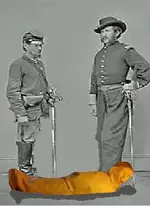Rebel - KGC
Platinum Member
It was the closest thing to a reasonable facsimile I could find at the time for a body sewn into a blanket.Ever watch Dexter?

NOPE! LOL!
It was the closest thing to a reasonable facsimile I could find at the time for a body sewn into a blanket.Ever watch Dexter?



 i got some beach front property in New Mexico I want to sell you!
i got some beach front property in New Mexico I want to sell you!
View attachment 1030591
Is this any better Rebel?
It's John Wilkes Booth in that blanket, do you know how I know that? because they got paid a share of the reward money by the Federal Government....and Politicians never tell a lie...and if you believe that bulli got some beach front property in New Mexico I want to sell you!
May the blessings of light be upon you,
Light without and light within.
And in all your comings and goings.
L.C.





 to Texas?
to Texas?
They were known as COPPERHEADS, and connected with KGC, CSA spies, etc. it was PERSONAL with J.W. as his friend BEALE, was hung by yanks in New York; Lincoln WOULD NOT intervene, thus, an "eye for an eye"...
Several years back, I Repaired a grandfather clock for a descendant of the Booth Family. He told me of his researching some family papers that he said weren't available to the general public, and he drew the same conclusions, that it was personal, as Lincoln would not intervene in John Yates Beall's execution.
According to Wikipedia:
Beall, a Confederate Privateer, after a failed plan to free Confederate prisoners from Johnson's Island in lake Erie, decided to free some captured Confederate officers by derailing a passenger train, but he and a companion, George S. Anderson, were arrested in Niagara, New York, on December 16, 1864. They were imprisoned at Fort Lafayette, New York. Anderson agreed to testify against Beall in return for leniency.
General John Adams Dix ordered a military commission for Beall's trial, which began on January 17, 1865. He was represented by James T. Brady. The arrest of Beall had not been published in any newspaper, and Confederate authorities were unaware of his status. On February 8, the commission found him guilty on all charges and sentenced him to death. Beall was then transported to and held at Fort Columbus on Governors Island in New York Harbor to await his execution.
The story of Beall's arrest and trial then appeared in the newspapers, and efforts were made to save him. Appeals were made to the President by many prominent people, including six U.S. Senators and ninety-one members of Congress, but Lincoln refused to intervene, not wanting to undermine Dix's authority, and Beall was executed on February 24, 1865.
There is a legend discussed by Lloyd Lewis that Lincoln was approached by John Wilkes Booth, who was a friend of Beall's, to save his life, and that the President agreed to do so. But Lincoln changed his mind (the legend goes) when he was approached by his friend and Secretary of State William Henry Seward, who insisted that Beall's activities had been dangerous to the citizens of New York State (Seward's state). Supposedly a furious Booth determined to kill Lincoln and Seward for this betrayal after Beall was executed.
 The only way to see the whole truth about him is to go to Springfield and visit the Lincoln Librairy which has ALL of his diary....except for the parts that his wife would not allow the biographers to print about his affair with Mary Todd.
The only way to see the whole truth about him is to go to Springfield and visit the Lincoln Librairy which has ALL of his diary....except for the parts that his wife would not allow the biographers to print about his affair with Mary Todd.

 ......Now that Ficklin's K.G.C. links to Dr. William McKendree Gwin , Jefferson Davis, Judah Benjamin and a host of other Knights of the Golden Circle has been established, and his close association with Orville Browning to pull the cotton over Lincoln's face has been revealed the cloak is lifted and the truth is easy to see! Ficklin was the link to Booth that was never proven. He was the superintendent of the assassination of Abe Lincoln. They had him in custody for two and a half months without pressing charges on him. Nobody said his name during the trial he was released only after they were hung.
......Now that Ficklin's K.G.C. links to Dr. William McKendree Gwin , Jefferson Davis, Judah Benjamin and a host of other Knights of the Golden Circle has been established, and his close association with Orville Browning to pull the cotton over Lincoln's face has been revealed the cloak is lifted and the truth is easy to see! Ficklin was the link to Booth that was never proven. He was the superintendent of the assassination of Abe Lincoln. They had him in custody for two and a half months without pressing charges on him. Nobody said his name during the trial he was released only after they were hung.